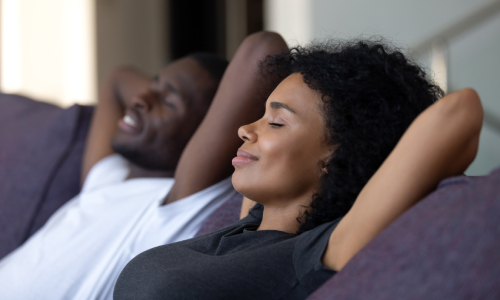Tips for better sleep if you have high blood pressure
- Overview
- 1. Keep a regular sleep routine
- 2. Limit light and noise
- 3. Make sure your bedroom is comfortably cool
- 4. Use your bedroom for sleeping
- 5. Prepare your body for sleep
- 6. Avoid intense exercise before bed
- 7. Avoid screens before bed
- 8. Have a bath
- 9. Calm your breathing
- 10. Meditate
- 11. Journal
- Related articles
When you're asleep, your blood pressure is often lower than when you're awake. If you're regularly getting less than six hours of sleep per night, studies have shown that you may be at an increased risk of high blood pressure, compared with sleeping 7–9 hours per night, as recommended by the National Sleep Foundation.
While getting a full night’s sleep may not immediately cure high blood pressure, sleep health is important for reducing disease risk, so we recommend following the below guidance to improve your sleep quality.
1. Keep a regular sleep routine
Aim to go to bed and get up at the same time each day, sleeping mostly when it's dark outside.
2. Limit light and noise
Make sure your room is dark (or wear an eye mask) and keep your bedroom quiet (or use ear plugs). Black-out blinds can help to block out the light during summer months.
3. Make sure your bedroom is comfortably cool
Being too warm or too cold at night can result in poor sleep. If you're too hot in bed, keep a window open, and if you wake up feeling cold, try wearing socks in bed.
4. Use your bedroom for sleeping
Try not to work or watch TV in bed as this can blur the link between the bedroom and sleep.
5. Prepare your body for sleep

For better sleep, try not to eat heavy meals in the evening, and avoid alcohol, caffeine and nicotine later in the day. If you like a warm drink in the evening, you could try a relaxing cup of herbal tea or hot milk
6. Avoid intense exercise before bed
High intensity exercise like running and HIIT can release adrenaline, making it harder to wind down afterwards. When exercising later in the day, opt for a light activity such as walking, stretching or yoga.
7. Avoid screens before bed
Where possible, try not to watch TV, use a laptop, tablet, or smartphone just before bedtime. When using your devices in the evening, set them to 'night mode' or a mode that filters out blue light.
8. Have a bath
Enjoying a relaxing bath in the evening can lower your blood pressure and prepare your body for sleep. If you do not have a bath, try soaking your feet.
9. Calm your breathing
Try the 4-7-8 pattern by breathing in through your nose for 4 seconds, holding for 7 seconds and breathing out through your mouth for 8 seconds, then repeat 3 times. If you find that too hard, try breathing in for 2 seconds, hold for 3.5 seconds and breathe out for 4 seconds, then repeat 3 times.
10. Meditate
Meditation helps to calm your body and mind and can improve sleep. Why not try our evening meditation? Or listen to our audio body scan? You can also find free, bite-size meditations on apps like Smiling Mind.
11. Journal
If your mind is active before bed, you could try writing down your thoughts or concerns, or share them with a partner, family member or friend to try and clear them from your head before sleeping.
References
Hirshkowitz, M., Whiton, K., Albert, S.M., Alessi, C., Bruni, O., DonCarlos, L., Hazen, N., Herman, J., Hillard, P.J.A., Katz, E.S. and Kheirandish-Gozal, L., 2015. National Sleep Foundation’s updated sleep duration recommendations. Sleep health, 1(4), pp.233–243.
Ogugu, E.G., Catz, S.L., Bell, J.F., Drake, C., Bidwell, J.T. and Gangwisch, J.E., 2022. The Association Between Habitual Sleep Duration and Blood Pressure Control in United States (US) Adults with Hypertension. Integrated Blood Pressure Control, pp.53–66.
Walker, M., 2017. Why we sleep: Unlocking the power of sleep and dreams. Simon and Schuster.
Last updated Thursday 5 October 2023
First published on Tuesday 28 March 2023

